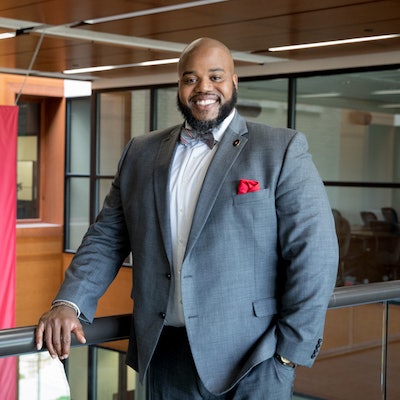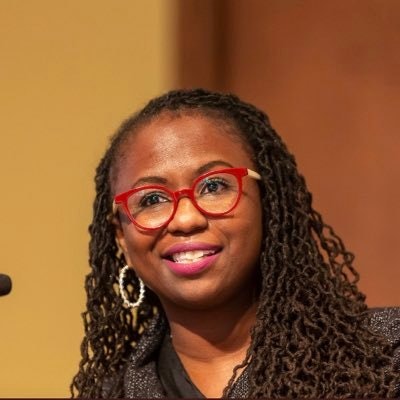Dr. LaVar Charleston had a crush on Dr. Sherri Charleston from the moment he met her in ninth grade.
 Dr. LaVar Charleston is the deputy vice chancellor for diversity & inclusion, vice provost and chief diversity officer at the University of Wisconsin – Madison.
Dr. LaVar Charleston is the deputy vice chancellor for diversity & inclusion, vice provost and chief diversity officer at the University of Wisconsin – Madison.
While the two were friendly, they had opposite interests at the time. He was the captain of the football team, and she was captain of the debate team. Their love story didn’t come to fruition until eight years after graduation, when they reunited at a mutual friend’s event.
“Sometimes it still surprises me when I think about the fact that we’re actually together,” said LaVar Charleston. “Since we reconnected at that event almost 19 years ago, we’ve been pretty much inseparable.”
At the beginning, their academic journeys followed different trajectories. LaVar Charleston studied public relations, marketing, educational leadership and policy analysis. Sherri Charleston studied the intersection of U.S. history, gender and race with the law. But before long, their expertise, personal experiences, and mutual passion for justice saw them giving speeches and offering consultations to businesses and institutions about the importance of diversity and how to build an inclusive environment.
Eventually, both became Diversity, Equity, and Inclusion (DEI) leaders. LaVar Charleston is currently the deputy vice chancellor for diversity & inclusion, vice provost and chief diversity officer at the University of Wisconsin – Madison (UW – Madison), and Sherri Charleston is the first chief diversity and inclusion officer at Harvard University.
Together, the two work to make organizational, leadership, and cultural changes that transform higher education into a welcoming space for marginalized populations. They collaborate on projects that improve access to graduate school for under-resourced students and students of color. The couple counts on each other for ideas, support, understanding, and perspective as they do the difficult, often emotionally taxing work of DEI professionals.
“We’re both nuts about organizational efficiency, excellence, and change. We geek out about this stuff when we have ideas, and we share these with each other,” said LaVar Charleston. “We’ve worked for nearly two decades collaboratively to figure out how to approach this work.”
The two came together to create the Graduate School Academy, partnering with the International Colloquium on Black Males in Education, the brainchild of Drs. Jerlando F. L. Jackson, formerly a professor and department chair at UW – Madison who is now the dean of the College of Education at Michigan State University, and James L. Moore III, a distinguished professor at The Ohio State University. The effort was quite simple: to improve the Black male educational pipeline. The Graduate School Academy helps students of color complete their applications for graduate school, overcoming any knowledge gaps created from being first-generation or under-resourced. The program has helped students become faculty, researchers, and policy makers.
 Dr. Sherri Charleston is the first chief diversity and inclusion officer at Harvard University.
Dr. Sherri Charleston is the first chief diversity and inclusion officer at Harvard University.
“In this case, I find myself more than lucky, because I have the best colleague to talk through these things in the house,” said Sherri Charleston, who was recognized by Diverse in 2019 as one of the publication's top women in academe. “It’s better for all of us—it’s better because we care about one another, and we made that commitment. We’re never too busy for one another, something I think has carried over since working on our dissertations.”
Jackson got to know the Charlestons when all three worked at UW — Madison. LaVar Charleston was instrumental in helping Jackson to start Wisconsin's Equity and Inclusion Laboratory (Wei LAB), whose groundbreaking research on equitable and inclusive learning and work environments informs policymakers and practitioners.
"Both of them are really forward-thinking, strategic-minded leaders who have contributed immensely to UW—Madison during their time there," said Jackson, adding that the Charlestons always seemed able to find a way to stretch their resources into remarkable success stories.
"When you are charged to move an institution forward, you may or may not be armed with the resources to move the agenda. But it’s your diplomacy and your advocacy that drives other leaders to think differently about how they’ve historically went about making decisions," said Jackson.
Their work, Jackson said, has produced "maximum outcomes" despite limitations, which ensures their institutions not only have a diverse student body but a similarly diverse workforce that supports the students after they arrive on campus.
"I can’t say enough good things about their ability to get these fairly elite institutions to commit to think differently about who belongs and who should be a part of their respective organizations," said Jackson.
The Charlestons played important roles at their institutions when Harvard and UW – Madison began to undertake serious review of their past history of racial discrimination. The UW – Madison Public History Project unveiled Sifting & Reckoning: UW – Madison’s History of Exclusion and Resistance, which surveyed the institution’s 150 years of history, including its connections to the Ku Klux Klan.
Earlier this year, Harvard released a 134-page report examining its connections to and use of slavery. The findings made it clear that the first 150 years of Harvard’s history were inextricable from enslavement, and the institution pledged $100 million toward an endowment for correcting the wrong. Sherri Charleston said she hopes both projects will help sustain the momentum DEI has experienced in the last few years.
“Our commitment is to the work at large, which drives us to collaborate on models for inclusion and belonging. We think broadly about how to move the field across the finish line together,” said Sherri Charleston. “This is a moment in which institutions across the country have been struggling with this moment of racial reckoning.”
The two agreed that, in order to participate and dedicate themselves to DEI work, rest and recuperation are vital. Sherri Charleston urged marginalized scholars and those working in DEI to learn how to say no, and to advocate for times when there are no laptops, no emails, no work. LaVar Charleston agreed.
“If you’re not filling your cup, you can’t bring your whole self to the space. We have to be whole people, which means feeding our spirits, souls, bodies, and being healthy,” said LaVar Charleston. “Do what you need to do to recharge. Our students and communities need us, and we’ve committed to this work—we can’t do it if we’re not whole people.”
Liann Herder can be reached at [email protected].
















